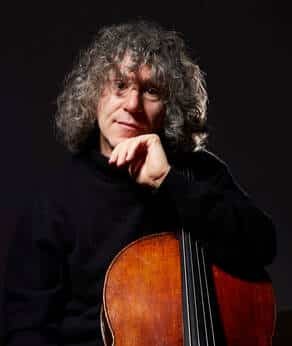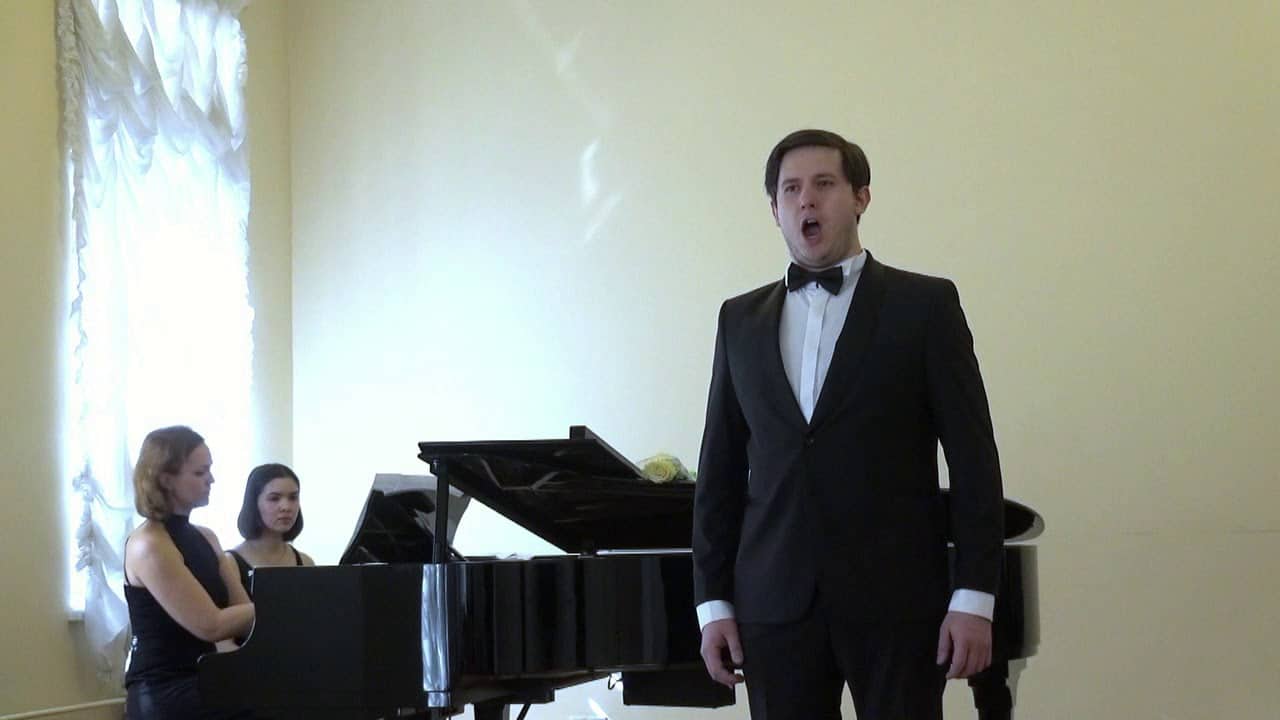Steven Isserlis: ‘There’s a lot of me, me, me playing which I cannot stand’
OrchestrasThe cellist has let rip in an interview with Daniel Lelchuk on things that displease him.
Like: ‘If you ever hear me say I’m excited about such and such concert date, feel free to shoot me.’
And: ‘Great musicians around? Certainly not in the numbers there were.’
Watch below.






Thank you, Daniel, for bringing Steven to this interview. We performed together some thirty years ago, and I fell in love with his playing. Freedom, sincerity, heartfelt lyricism. Humble, authentic, natural and pure. Everything he says is spot on. It’s so funny, we say the same things and revere the music making of pre-WWII, the sincerity and sound world, less showy and more about the composer as a living being. It’s not me, me, me. Precisely. And YES! Every instrumentalist should play as they sing it, and bring listeners in rather then be showy and in their face. The reference to YouTube is true. There are many musicians we’ve never heard of from the 1930s-50s who played divinely. What would be amazing as time moves on, would be new cello concertos composed specifically for Steven. And hopefully he’ll play the third movement of the Brahms Second Piano Concerto! Bravo, Steven and Daniel!
Do you ever write a comment or think a thought that isn’t quivering, simpering ass-kissing and bootlicking?
My dear, ask the many composers whose new music I helped get into the repertoire without self promotion nor fund raising fees acquired. Not about me. It’s for the future. Sorry you see it a different way. It will matter in 50 years.
Forgive me if I’m wrong, but over the years I feel that each comment you have made on SP has an element of self-promotion to it. This ends up backfiring.
You are spot on, Pierre. Jeffrey “How can I find a way to make this be about me” Biegel strikes again.
Sorry you see it that way. Quite the opposite. I am so happy to see the fruits of many years of work with composers and new music in other pianists performances of the works brought into the repertoire. That’s not about me. It’s about the future. We all become a memory, what we leave behind is what will be remembered. Not these comments. However, I hope they will be seen in 30-40 years from now.
I forgive you. Yes, you are wrong. The promotion is for music, not for me, nor the composer. Nothing has backfired, rather, 118 orchestras have been part of this goal. In fifty years, it won’t matter who won a prize, or played another fine performance of a standard concerto. I do love playing the traditional repertoire, but leaving a legacy for the future generations far outweighs the challenges of negativity from people today who see it any other way.
I saw him play just yesterday with the Israel Camerata and Paul Daniel – Haydn C major and Tavener Eternal Memory. He is still at his very best.
Last time I saw him play he was indeed wonderful and after he had played his piece he sat with the audience to hear the rest of the concert.
Mr Isserlis is one of the few string players whose sound is immediate identifiable for its most pleasing and attractive characteristics.
He is more than a cellist—he’s a passionate musician who has forged a career without the need to conduct or record light melodies for the masses.
My father greatly admired his playing, recognizing immediately the influence —but not imitation— of Shafran.
May his hair grow long and curly forever.
As a counterpoint to his view, I would point out that most artists today are incredibly conservative, formatted, lacking imagination and heart, which results in absolutely boring performances that all sound indistinguishable from one another.
The rare few that do stand out from the rat pack are those that have unique, deeply original and personal musical voices.
The theory that interpretation does not exist, or that musicians should just reproduce the notes on paper, is a fallacy. Even if you ask ten artists to play the same score while being as faithful to the text as possible, you will get ten very different interpretations, because of the musicians’ own personalities, educations, sensibilities. See historically informed performances for an extreme example of that.
Karajan very rightly said that a piece of music is like a snowy landscape. Even if you try not to disturb it, you will inevitably leave footsteps in the snow.
Besides, and this is why classical musicians (at least the good ones!) will never be replaced by AI, musical notation is not a science. What is forte, what is piano ? What is allegro, adagio ? That is all relative, and highly context specific !
What Isserlis does get right is that there is certainly a lack of spiritual depth among most artists, although that has always been the case. It takes a special kind of person to spend hours asking themselves questions about any given work, trying to arrive at a certain kind of truth, which will inevitably be theirs only. And the stronger the personality, the more vivid and valuable will the results be.
I suspect that people who dislike artists with strong personalities value music only as a form of pleasant entertainment. But music must be disturbing, must be shocking, because only then does it serves its deeper purpose as an art form. In Mozart’s time, classical music was mere background for people eating dinner, talking among themselves. Mozart’s primary goal as a composer was therefore to be heard, and listened to. He certainly achieved that, by being bold, original, disturbing.
I do believe that interpreters are as important as composers. A great interpreter can make a piece of music shine, and make more people discover its riches.
This is what makes classical music so wealthy, it’s the infinite variety of viewpoints. The variety of interpretations resulting from the direct relationship of the individual to the piece of art is here multiplied many times over by the presence of that middle man, the interpreter.
Great interpreters can make us discover sides of cherished musical pieces we didn’t even know existed. This is why originality should be treasured. Classical music, by its very nature as performance art, is not a museum, but a living, breathing, ever changing thing.
Well-meant comment, but some corrections are in place.
“I suspect that people who dislike artists with strong personalities value music only as a form of pleasant entertainment. But music must be disturbing, must be shocking, because only then does it serves its deeper purpose as an art form.”
Wrong. This is a very conventional modernist trope from the last century: if a piece sounds beautiful, it must be entertainment, so: not serious; if it is to be serious – i.e. serving its deeper purpose as an art form – it should be disturbing, shocking, so: ugly, indigestible, repulsive. The result of such absurd thinking is the ocean of deeply disturbing, ugly, bad, unmusical, pretentious crap being presented as ‘the’ new serious music – however old hat it has become after a century of vain attempts.
“In Mozart’s time, classical music was mere background for people eating dinner, talking among themselves.”
Wrong. Serious music was a serious thing, performed in the churches and at the courts, and in the salons of the nobility. Where it was not taken very seriously, was merely showing-up the ignorance of patrons and listeners – just as today listeners chat through performances or look at their cell phone. When public concerts developed, open to everybody who could pay a ticket, audiences had to get used to the type of event because it was new. Only in the course of time the tradition developed of listening in attentive silence. But surely public concerts by Beethoven were listened to in silence. Mozart was avantgarde in that he organised his own concerts and played his piano concertos, which was a new form at the time, that is: the way M wrote and played them. Often enough the audience got silent, as he writes in his letters. And he was bold, original, and only occasionally (!) disturbing not becasue he wanted to be listened to (i.e. to draw attention), but because of the urge of realising and sharing his musical ideas. He wrote that he wanted to compose music ‘..für Kenner und Liebhaber’, i.e. for both the innocent listener and the professional. This shows he never wanted ‘to disturb’.
With the last paragraph I would wholeheartedly agree, except for this passage:
“The variety of interpretations resulting from the direct relationship of the individual to the piece of art is here multiplied many times over by the presence of that middle man, the interpreter.”
This suggests that it is the performer who is actually providing the meaning of the piece itself, ‘making’ the piece, but what really happens – with a truly good interpreter – is that he/she DISCOVERS and UNVEALS aspects that are in the piece in the first place, because they are the vision of the composer. The performer is not the creator but the recreator and midwife, and the composer hopes for the understanding of the performer to get his piece to be born into the world. So: understanding of what is in the piece already and can only be suggested by notation and with the help of a living tradition. Nothing is as deplorable as performers who consider scores merely as the material THEY need to project their ego, as if it is THEM who create the music, while in most cases they could not even fulfil simple harmonic or contrapuntal school exercises. This is what makes Isserlis stand-out from so many performers, he understands the real nature of the team composer/performer and that is why he is so good.
In re-creating music, it is definitely not about me. It is actually not about the composer, to some extent. It is, in that who they were/are is evident in what they created. Like a painting, we interpret the story of the painting, the emotions, the angles, the colors etc. We rarely discuss the artist, except for the time they lived and what was happening around them at the time they created the painting. We do this in music, talking about what was happening in the world when the composer created the music. But we always interpret the music based on the time period, structure, sound of the composer, the phrasing, breathing and colors created through doing. We, personally, are not on the menu. We do not move the listener, the music does, much like the painting.
Yes! And what I find interesting is that what was a ‘forte’ sound when the music was composed, was for different instruments in a different sound world. Music evolved, and as you say, is a living, breathing thing.
Great discussion about important things for any performer, and a great lesson for aspiring composers. Main aspect: classical music is about interiority and musical sincerity, not about carreers, fame, ego trippery.
Please. No one is more “me me me” than Isserlis. Just watch the video. He drips self-congratulation, insecurity, superiority posturing and narcissism from start to finish.
And he always did.
No, he simply combines self-confidence with humility. The distinction may be subtle but is there.
Wrong! Fake humility that functions much like a hug after a domestic violence incident.
Got that right, he’s *very* difficult to work with.
I’m very easy to work with, and look how that got me here.
Sally
Absolutely. It’s hardwired.
So either an entertainer behaves in a manner Mr Isserlis deems apropos or they are excommunicated from the corps of artists.
C’mon, Steven, at the end of the day you are an entertainer, right? Why would you disapprove of someone just for how they present their performance?
Professional musicians really do have an inflated sense of self importance.
It is this way of thinking which is one of the causes that drive the erosion of understanding what classical music is. People who don’t understand it, should visit other channels for their entertainment, and leave classical music to the people who know something about it.
Classical music is neither a form of entertainment, nor a business, but an art form, reflecting the human mind, and one of the most important fruits of our civilisation. That there often is an element of entertainment in its works, is merely because of its wide range of emotional material, and a bridge to enter the interiority of the work, and a spirited, entertaining aspect often is, in the same time, taking place on a high artistic level. Example:
https://www.youtube.com/watch?v=bwUreaifVa8
Given the extreme banality of modern society, the art form has to be defended against ignorant populism, there are enough other sources for entertainment that is not burdened with meaning.
‘Professional musicians really do have an inflated sense of self importance.’
Damn straight. And another thing I noticed, no one hates a self-obsessed diva more than another one.
Hell yeah! Tell it!
Those gut strings are still not convincing.
A fine player. But an abrasive personality whose arrogance and unprofessional attitude have seen him unofficially blacklisted by – to my knowledge – at least two major UK promoters.
Promotors prefer the easy-going, smooth operating entertainers, who want nothing more than to conform to the business, the rules of which are determined by what promotors prefer.
Talk about the pot calling the kettle black. Mr. Isserlis ought to be reminded of the old maxim, “Know thyself.”
I’ve played with Steven Isserlis. Schumann chamber music, one of his great obsessions. All I can say is: “He’s no Steven isserlis”.